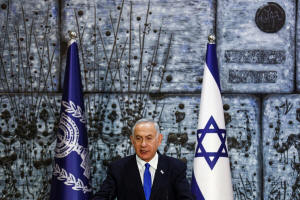|
Netanyahu was tapped to lead the country following a right-wing
victory in a Nov. 1 election. He has secured majority support in
parliament, but has yet to finalise the coalition agreements.
With his initial mandate set to expire on Sunday, Netanyahu
sought the maximum two-week extension allowed by law. President
Isaac Herzog, whose job as head of state is largely ceremonial,
gave him an extra 10 days.
Coalition talks have dragged on longer than expected, since
Netanyahu from the outset had support from right-wing and
religious parties that control 64 of the Knesset's 120 seats.
A main sticking point has been who gets which ministerial post
and the distribution of power between them, Israeli media has
reported.
The centrist opposition had urged Herzog not to grant an
extension, accusing Netanyahu of buying time to pass divisive
legislation. One such bill would enable a senior partner of
Netanyahu to serve in cabinet despite a criminal record.
Should Netanyahu fail to meet the deadline, Herzog can task
another member of Knesset to try forming a government.
Otherwise, a new election will be called. A prolonged political
stalemate has led to five elections in less than four years.
Currently an outgoing caretaker government remains in office.
"These are complex days for Israeli society when disputes over
fundamental issues threaten to tear apart and ignite violence
and hatred," Herzog said in a letter to Netanyahu that his
office made public.
He called for the formation of a government that represents the
entire country and for a coalition that maintains a respectful
dialogue between the branches of government.
(Reporting by Ari Rabinovitch, Editing by William Maclean, Nick
Macfie and Andrew Heavens)
[© 2022 Thomson Reuters. All rights
reserved.] Copyright 2022 Reuters. All rights reserved. This material may not be published,
broadcast, rewritten or redistributed.
Thompson Reuters is solely responsible for this content.

|
|




